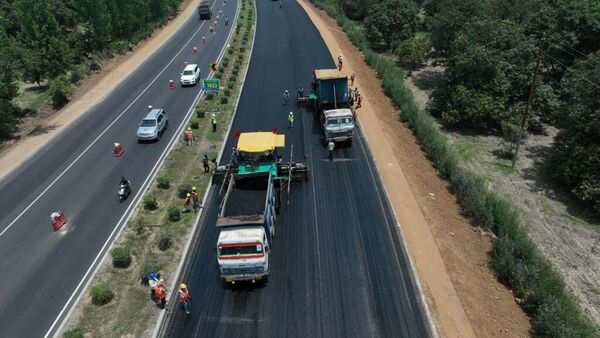
NHAI aims to reduce potholes on highways with new self-repairing tech. Learn more
By Sumaiya | Published | No Comments
The National Highways Authority of India (NHAI) said the new approach would enable roads to ‘repair’ themselves using a special type of asphalt infu.
…

India’s highways, the vital arteries of the nation’s transportation network, continue to face challenges, reflecting a broader narrative of infrastructural inadequacy. Despite continuous efforts to expand and modernize the road network, many Indian highways suffer from problems including potholes. This often contributes to accidents.
While steps are taken to improve conditions, the National Highways Authority of India (NHAI) aims to revolutionize road maintenance in the country with new innovative technologies. The approach will enable roads to be ‘repaired’ on their own using steel fibers and a special type of asphalt mixed with bitumen, NHAI said.
This new material will automatically fill gaps and potholes, addressing a persistent issue that contributes significantly to road accidents and fatalities in India. DD News reports that NHAI officials are optimistic that this technology will effectively fix the problem of potholes. However, the exact time it will take to cover the asphalt and ‘repair’ potholes or gaps is unknown.
Also Read: MoRTH builds 12,349 km of highways in FY24, second highest after FY21
Another report quoted a senior government official as saying, “We are looking for innovative and unconventional methods to increase sustainability and address the issue of potholes.”
Asphalt, a durable paving material, is commonly used to construct pavements, highways, airport runways, parking lots, and driveways. This speeds up construction, is eco-friendly and ensures a smooth, quiet ride.
Asphalt is usually made by combining aggregates, binders and fillers. Specialized trucks then transport the hot asphalt mix to the desired location, where it is spread and compacted using heavy machinery. However, over time, bitumen deteriorates, leading to asphalt erosion and the formation of cracks that eventually become dangerous potholes. New technologies aim to overcome this degradation.
Before going ahead with an initiative, the government wants to do a thorough cost-benefit analysis. NHAI is confident that the innovative technology will not only increase the life of roads but also reduce traffic disruption caused by potholes.
Date of first publication: 09 May 2024, 07:18 AM IST
| Denial of responsibility! Thelocalreport.in is an automatic aggregator around the global media. All the content are available free on Internet. We have just arranged it in one platform for educational purpose only. In each content, the hyperlink to the primary source is specified. All trademarks belong to their rightful owners, all materials to their authors. If you are the owner of the content and do not want us to publish your materials on our website, please contact us.The content will be deleted within 24 hours. |





